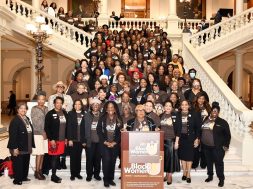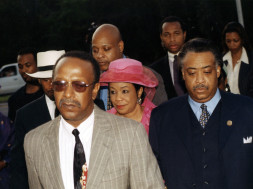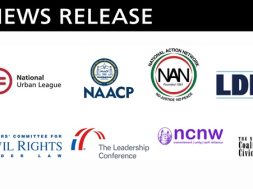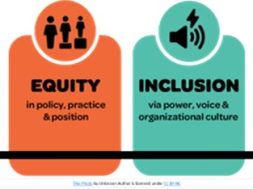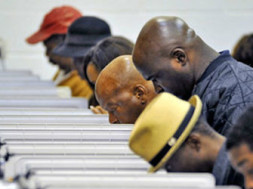
Federal EEOC Warned Census Bureau of Likely Discrimination, Outten & Golden Claims in a Lawsuit
New York — New evidence in a federal lawsuit shows the U.S. Census Bureau ignored a pointed, detailed warning by the federal Equal Employment Opportunity Commission (EEOC) that its screening process for hiring more than one million temporary census workers could result in massive racial and ethnic discrimination.
A coalition of civil rights organizations today filed an Amended Complaint in a class action lawsuit against the Secretary of the U.S. Department of Commerce, the Census Bureau’s parent agency, citing the EEOC’s warning along with other newly uncovered evidence in a case which seeks compensation for more than 100,000 minorities who were not selected for census work because of unprosecuted arrests and old, minor, and irrelevant convictions for offenses such as unlawful assembly and loitering.
Ironically, the U.S. Justice Department, which is defending the Census Bureau, has its own regulations against use of arrest records where there has been no conviction, and against forcing job applicants to obtain official certification of no criminal record – the very devices the Census Bureau has used to screen out job applicants.
The original lawsuit commenced in April. Plaintiffs in the case are Eugene Johnson of Bronx, NY, Evelyn Houser of Philadelphia, Sandra Anderson of Albuquerque, Anthony Gonzalez of Riverview, Fla., Ignacio Riesco of Lynn, Mass., Precious Daniels of Detroit, and Felicia Rickett-Samuels of Stamford, Conn. The plaintiffs are seeking to create a national class of all those African Americans, Latinos, and Native Americans illegally deprived of their opportunity to obtain census jobs.
The Census Bureau illegally screened out applicants with often decades-old arrest records for minor or un-convicted offenses that typically would not have deterred other employers including other federal agencies with high security concerns such as the Transportation Security Administration, says the Amended Complaint filed in U.S. District Court in New York.
“Under the discovery process resulting from the filing of the original lawsuit, we uncovered new evidence that clearly shows the Census Bureau designed and implemented a hiring review system they had every reason to know would result in massive discrimination,” said Atty. Samuel R. Miller of the New York-based law firm Outten & Golden LLP.
The coalition supporting the lawsuit includes Lawyers’ Committee for Civil Rights Under Law, Washington, D.C., Center for Constitutional Rights, New York, Community Service Society, New York, Indian Law Resource Center, Helena, Montana, Community Legal Services, Inc., Philadelphia, LatinoJustice PRLDEF, New York, and Public Citizen Litigation Group, Washington, D.C.
The coalition set up an Internet site so others could obtain information and explore their rights: www.censusdiscriminationlawsuit.com.
“The Census Bureau was well aware of its discriminatory screening process. We found that ten years earlier it used a similar system that filtered out tens of thousands of minority applicants,” Miller said. “It is shocking that the Bureau used the same system to screen workers for the 2010 census.”
“As a precondition for employment, the Bureau required applicants who had ever been arrested to produce official court documentation — within 30 days — showing the disposition of all arrests, even if those arrests were so long in the past or so minor that the probability of any new brush with the law was essentially zero,” said Atty. Adam T. Klein, co-counsel in the case at Outten & Golden.
“The Bureau knew full well that the burden of obtaining these records would be too great an obstacle for over 90 percent of these applicants,” Klein added. “Considering the fact that many of the applicants’ records had been expunged, and that many of the offenses were minor, very old and non-job related, the federal government clearly acted unlawfully under the Civil Rights Act.”
In addition, the lawsuit says, the Census Bureau never made clear its procedure for selecting applicants and kept its hiring protocol a “closely guarded secret” for over a decade – even from Congress.
“The Bureau’s secret formula is tantamount to a ‘no arrests allowed’ policy,” Miller said. “That is discrimination.”
The federal EEOC, in a detailed letter written by the agency’s Acting Chair Stuart J. Ishimaru dated July 10, 2009, criticized the Census Bureau for potential racial discrimination saying the screening process “suggests that the Census Bureau’s approach is overbroad and may run afoul” of the law.
“Unless there is a record that an arrest resulted in a conviction, an arrest in itself is not evidence that a person engaged in the conduct alleged. Therefore, without confirmation, the Census Bureau should not disqualify people based on an arrest record,” the EEOC letter said.
“About 14 million people in the United States are arrested per year. That means about 70 million people, more than 20 percent of our adult population, have a criminal record,” Miller said. “The FBI retains virtually all arrest records in its database forever – even for juvenile offenses. However, the federal government recognizes that restrictions on hiring individuals on the basis of arrest records are discriminatory and illegal.”
Applicants were subject to FBI background checks. If the FBI found an arrest in the applicant’s past, the applicant had just 30 days to produce the “official court documentation” showing disposition of the case if they wanted to remain eligible for employment. Despite knowing this requirement would adversely impact minorities more than whites, the Census Bureau continued to use the screen. The result: about 90 percent of those with arrest records never pursued applications.
The suit charges the Census Bureau with being reckless, if not intentional, in eliminating from this public service a larger percent of minority applicants than white applicants.


